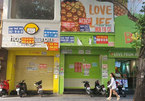 |
| E-commerce dominating as retail spaces struggle. -- Source: freepik.com |
Despite reducing rent by 20 per cent and then later to as much as 50 per cent, landlords in the central areas of these two cities are suffering as their tenants are giving back the rented spaces which remain unoccupied for months.
Nguyen Van Hien, owner of a fashion kiosk in Ho Chi Minh City, said that she has to pay VND40 million ($1,700) per month for rent, staff’s salary, and other expenses. However, during the last year, Hien’s revenue was only 30 per cent compared to before the pandemic.
“I am negotiating with my landlord to reduce the rent by a half to keep this business until the pandemic is over. However I do not know how I can survive till then,” Hien said.
Many street kiosks located in the Phu My Hung Township in Ho Chi Minh City’s District 7 have been closed for the past several months, even before pandemic restrictions were tightened. Most of these businesses are active in accommodation, food and beverages, and beauty and massage services. With a rent of more than $5,000 per unit per month, many tenants cannot ensure their livelihoods during these times.
Nguyen Van My, a landlord in Lang Street in Hanoi, said that his house was returned by the tenant in February, even though he had offered a 50-per-cent reduction in rent. “My tenant is a fruit trader who could not manage to exist anymore after many months of making losses. Moreover the house has been unoccupied since then with zero demand,” My said.
Like the tourism-residential real estate segment, the retail space also fell into a double crisis. The outbreak of COVID-19 has caused closures and merges many large retailers such as Auchan, Parkson, and Big C.
The latest case belongs to the South Korean retail giant Lotte Mart which will permanently close its centre in Hanoi’s Mipec Tower on July 1 due to restructuring plans. A representative from Lotte Mart insisted that the closure of this centre was to reshuffle the group’s investment strategy and expand its network nationwide, but did not elaborate on whether Lotte Mart had been impacted severely by the pandemic.
Despite the serious impact of the pandemic, Vietnam still sees the demand for rental space from luxury brands that want to expand and enter the domestic market.
Figures from the Ministry of Planning and Investment show that among the 66 new registered projects in the Hanoi at the end of March, five projects belong to trade centres and supermarkets with around $13.5 million of total foreign investment inflows. All five projects were invested by retail developers coming from Japan and South Korea.
Matthew Powell, director of Savills Hanoi, confirmed that high-end retail in Vietnam is one of the best-performing markets in the world. “Currently, there are many luxury brands that want to expand and enter the Vietnamese market. Retail rents in Vietnam are relatively low compared to other markets in Asia such as Singapore, Hong Kong, or Tokyo,” Powell said.
Due to travel restrictions, buyers currently mainly look for luxury products right inside the country, instead of going to other markets.
Moreover in recent years, Vietnam’s average income has increased markedly with a significant rise of the middle class, which has expanded corporations’ target market. Powell also added that, the retail market in large-scale trade centres would continue to develop in Vietnam.
In the cities of Hanoi and Ho Chi Minh City, the retail real estate market saw the expansion of foreign brands such as Uniqlo, Muji, and Decathlon over the last two years. Luxury brands such as Balenciaga and Tiffany are also planning to enter the market. These retail brands are attracting many customers from different market segments, rather than just targeting a single one.
During the pandemic, social distancing measures have accelerated the participation of many businesses in e-commerce.
Online traffic on Vietnam’s shopping sites in 2020 skyrocketed by 150 per cent against a year earlier, with daily visits to e-commerce sites growing to 3.5 million, as figures from the Vietnam e-Commerce Association state.
Nearly a third of the population participates in online shopping. Most online shoppers are young people between 18 and 25, with 77 per cent of internet users shopping online at least once in 2019, mainly on mobile devices.
The report on Vietnam’s Digital Advertising Market by Adsota and its strategic partner SOL Premier released earlier in June noted that e-commerce platforms in Vietnam have entered a golden era due to the pandemic.
The number of new users on e-commerce platforms in Vietnam reached more than 41 per cent, the highest rate in Southeast Asia, compared to the average growth rate of the whole region of 36 per cent. Up to 91 per cent of the new users in Vietnam confirmed that they would continue using e-commerce platforms, even after the pandemic.
Vietnam’s e-commerce has achieved impressive growth of 18 per cent as the market size has reached $11.8 billion, accounting for around 5.5 per cent of the national retail sales of consumer goods and services.
According to the National E-commerce Development Master Plan for the period 2021-2025, by 2025 up to 55 per cent of the population will participate in online shopping, with the average value of online purchases of goods and services amounting to about $600 per person per year.
Source: VIR

Experts: E-commerce to grow solidly in 2021
Vietnam’s e-commerce market will maintain its solid growth trajectory this year, analysts said at a ceremony announcing Vietnam’s E-Business Index within the framework of the Vietnam Online Business Forum on Tuesday.

Landlords await tenants as empty space increases
As a result of the ongoing Covid-19 pandemic, the rental market in HCMC has plummeted, pushing many landlords into difficulties as tenants have left, leaving empty spaces in their wake and no takers.